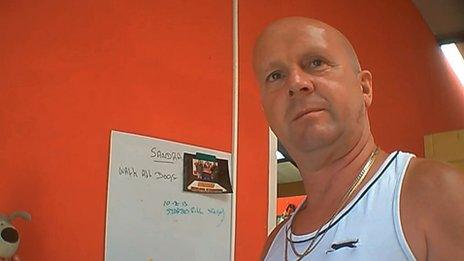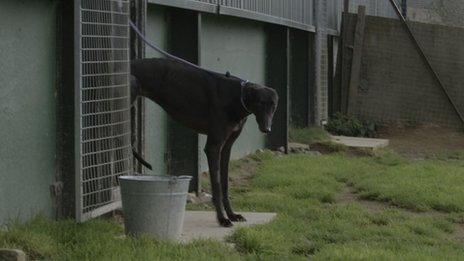Undercover reporter finds greyhounds 'drugged to rig bets'
- Published
Secret filming of trainer Chris Mosdall admitting he doped dogs
An investigation has exposed blatant cheating and the drugging of dogs at the heart of greyhound racing, leading to calls for changes to how the sport is regulated.
Greyhound racing is a £1.5bn industry. Bookmakers make an annual profit of £237m, while the trainers who are responsible for looking after the dogs make a loss each year of £3m.
An undercover investigation by Panorama has caught a trainer revealing how he doped greyhounds in order to rig bets - which he claims have paid out up to £150,000.
The trainer, Chris Mosdall, has raced at a number of tracks but most recently been racing weekly at Wimbledon Stadium, home of the English Greyhound Derby - the most prestigious race in the sport. He told the undercover reporter that he doped dogs in his care despite knowing the risks to their health.
He said he must wait a couple of months before doping a dog for a second time as the practice messed her system up. "You will burn her kidneys out," he said.
And despite boasting that he was known as "the biggest crook in Wimbledon," he revealed that he had long been able to get away with cheating, saying: "It's been ten years since I've been caught."
By slowing a dog, a trainer can lengthen the odds on it and even get it re-graded so that it only runs against lesser dogs. Then, once it has has been categorised as a long shot, he can run it without drugs, vastly increasing its chances of winning - this is race fixing and is illegal.
Panorama bought a dog from Mr Mosdall, which he continued to kennel and train, and covertly filmed him showing the drug he used to alter the dog's performance.
Three days later he said he had used the drug to dope two dogs before they raced and correctly predicted the effect the substance would have on their placings.
Retain licences
We also examined the record of the regulator - the Greyhound Board of Great Britain (GBGB) - in dealing with trainers whose dogs tested positive for drugs, including substances such as steroids, beta blockers or cocaine. In some instances, trainers have accumulated multiple positive tests while being allowed to retain their licences and continue racing their dogs.

Mr Mosdall said he treated his dogs with love and care
The GBGB have apparently been repeatedly warned by other trainers in the last two years that some dogs at Wimbledon showed signs of having been drugged.
But Mr Mosdall was only stopped after the GBGB was alerted about the undercover investigation. Hair from eight dogs in his care were tested for drugs. Six were negative, while two, including the dog bought by the undercover reporter, were positive. He is currently suspended awaiting a disciplinary hearing.
The trainer said he treated his dogs with love and care and that he would never do anything to harm them. He said that he regretted the admissions he had made to the undercover journalist, and said that he had only been trying to convince him that he could give his dog an advantage.
'Not working'
The findings have prompted animal welfare campaigners to call for the government to reconsider the sport's self-regulatory status. The Department for Environment, Food and Rural Affairs is currently preparing to review existing legislation relating to greyhound welfare.
Eric Martlew, a former MP and ex-chairman of the associate parliamentary group for animal welfare, said: "I think we've given self-regulation a chance. And I think we've seen that it's not working."

The fate of retired greyhounds remains a contentious issue
Panorama's investigation began following concerns that the GBGB was failing in its remit to clean up the sport after a major scandal eight years ago.
In 2006 it was revealed that retired dogs were being delivered to a man in County Durham who was killing and burying them for £10 each. David Smith was fined £2,000. It was estimated that he had disposed of around 10,000 dogs.
The GBGB was set up in response to the scandal, and charged with making the sport more accountable.
But even now, the fate of retired greyhounds remains a contentious issue.
Clarissa Baldwin, former chief executive of the Dogs Trust and chairman of the Greyhound Forum, the industry's interface with animal welfare organisations, said: "There are about 8,000 greyhounds we believe go into racing each year, (which) sort of pre-supposes that 8,000 come out at the end. We know that the Retired Greyhound Trust re-home 4,000 and I think the other charities probably 1,500. So there's a gap there."
The discrepancy in the numbers has led animal welfare campaigners to conclude that up to 2,500 retired greyhounds are still being killed each year.
However, while the GBGB compiles data about what happens to greyhounds when they finish racing, it refused our requests to see it.
Mrs Baldwin explained how her attempts had also been frustrated by the GBGB.
She said: "We have been given the absolute runaround. We have been to the chairman, back to the chief executive, back to the chairman, and still they will not be transparent about the numbers of dogs that are killed at the end of their racing life."
The GBGB said it has full and comprehensive rules, which stand up to comparison with any other regulated sport.
It also said that sanctions were the decision of an independent disciplinary committee or appeal board and not that of the GBGB itself.
In regard to Chris Mosdall, the GBGB told Panorama that in the last two years greyhounds connected to Mr Mosdall were tested 55 times. One was positive and he was cautioned.
GBGB told Panorama it does not accept it has any requirement of duty to release data on injury or euthanasia.
Watch Panorama: Drugs and Money: Dog-racing Undercover on BBC One at 20.30 GMT or later on iPlayer